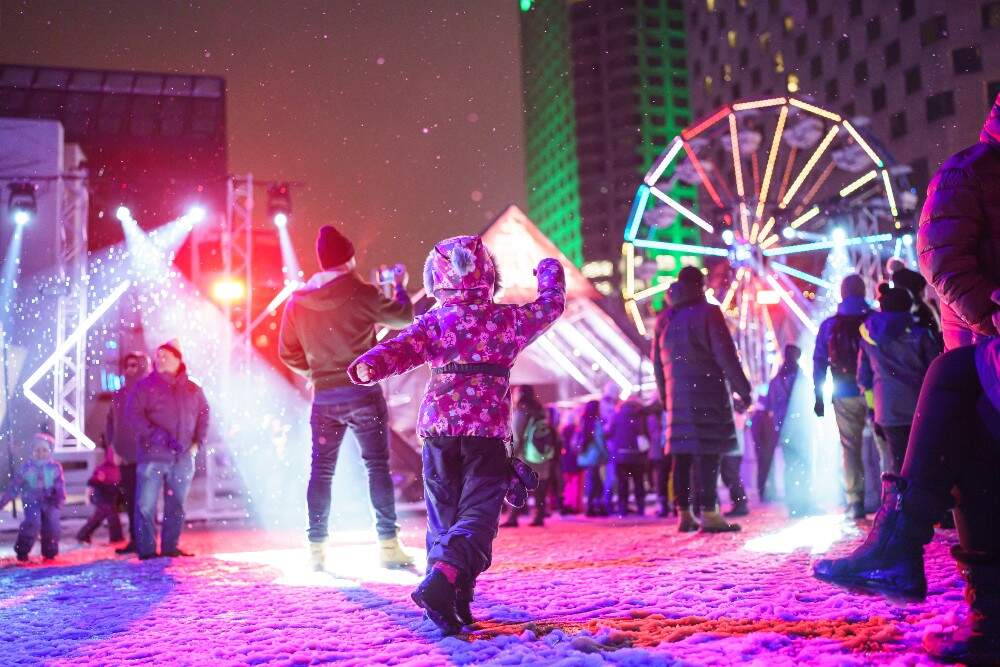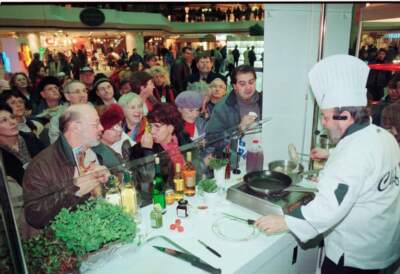Advertisement
Commentary
Montreal knows how to winter. Boston could learn

It’s 9:34 p.m. on a Thursday in late January. I’ve just cracked open my second Sapporo and German DJ and performer Stephan Bodzin is taking over the controls on a massive stage flanked with lasers and surrounded by thousands of revelers. It’s a scene straight out of Ibiza, Miami or any of the sun-splashed destinations to which many Bostonians flee every winter. But the concertgoers here are wearing parkas, ski suits and wool hats. The temperature has dipped below freezing. And the punishing wind off the St. Lawrence River turns my cheeks beet red.
Welcome to Montreal, where a different kind of winter is possible.
I started coming up here with my family during the darker months as a teenager, many years ago. The promise of relatively affordable restaurants, museums and nightlife was enough to lure us from the more Spartan winter experience in the Greater Boston area. Down here, once the December holidays are over, we go into hibernation for three months, as the area is socked with sleet, snow and freezing rain. But it wasn’t until that first lonely winter of the COVID-19 pandemic that I really began to wonder: Is this healthy?

Retreating indoors for one-quarter of the year deprives us of social engagement and recreation. And that’s when I thought of those family voyages to Montreal. I remembered being 17 and contemplating the tempting spectrum of things you can experience in a major city. I recalled stepping out of a bustling Lebanese restaurant at 11 p.m., climbing aboard a packed, chatty train and rumbling toward Rue Sainte-Catherine with a sense of nocturnal possibility. In 2021, I started taking my own trips to “MTL," not just for merriment, but for inspiration.
That’s how I found myself amidst the bundled-up masses at Igloofest — a multi-week electronic dance music (EDM) festival where globe-trotting DJs work their magic in arctic conditions. This unlikely series of outdoor parties is succeeded by the even grander Montréal en Lumière festival, which transforms great swaths of the city into a savory, illuminated winter wonderland. This year, you can glide around a glowing urban ice skating loop, sample mouthwatering bites from local and visiting chefs (including Oleana’s Ana Sortun!) and warm up with hot chocolate inside a toasty chalet. Many of the offerings are free or next-to-free, which demonstrates an important dimension of Montreal’s approach to winter: the idea that everyone should get to enjoy culture and recreational opportunities, regardless of their means.
Every time I return to Boston from a system-shocking winter escape to Montreal, the five words flashing through my mind are: We could do this here. Or rather, we should do this here.

Bring up affordable, diverse nocturnal offerings, or any cultural innovations that would probably encourage more of us to get out and about during winter, and you will inevitably hear people insist that Bostonians just don’t want that kind of stuff — that we’re perfectly content to be “the city that always sleeps.” But is this really true? Could it be puritanical presumption?
When the cities and towns of Greater Boston do orchestrate winter events — especially nocturnal after-work events — the turnout tells a more optimistic story. Recall the long lines of people waiting to visit the Snowport winter market in the Seaport or the crowds that pack Spontaneous Celebrations’ headquarters for their annual JP Holiday Market. Consider the recent buzz over the Downtown Boston Business Improvement District’s (BID) Winteractive display, which includes gigantic clown-head sculptures and a glowing whale installed in Downtown Crossing. Or the current buzz over the “Winter City Sauna” (and cold plunge) that just opened on the Rose Kennedy Greenway.
That word, “innovation,” is one we’re used to hearing around Greater Boston. And yet, for all the local advances we’ve made in medicine and technology, we still haven’t been able to figure out how to make our winters more engaging and enlivening. That’s not to say local changemakers aren’t trying. We’ve seen promising upstarts like the Play Shed at Dorchester’s Town Field, where people can borrow winter sporting equipment for free. Public demand for our legislature to loosen their outdated policy on limiting liquor licenses for Boston is getting louder by the week. And the current BID exhibit offers a vivid look at what a more thorough winter placemaking initiative could be like. Imagine if you could bundle up and head to Downtown Crossing to not only look at public artwork. but to enjoy some nourishing food and drink from vendors, warm your hands by a fire pit, listen to some live music and strike up a chat with fellow revelers.
A brighter, livelier, more savory winter like those in Montreal may seem a world apart to Greater Bostonians. But the festivities and seasonal amenities that our northern neighbor is renowned for are recent inventions. Up until the late 1990s, Montreal’s “underground city” (a subterranean network of shopping malls) was the backbone of winter gallivanting. But a weather-proofed mall doesn’t encourage recreation or cross-pollination between city residents and visitors; not like a roster of festivals and gathering spaces does. So Montreal decided to try something new.
Boston could do this, too. It will take public and private investment and policy changes regarding nightlife and transportation (like offering more late-night MBTA service!). But most of all, it will take a cultural reset — a new consensus that winter doesn’t have to be such a grim, lonesome slog. Instead, it can be a time of joy, a balm for isolation and a boost for our collective health.
